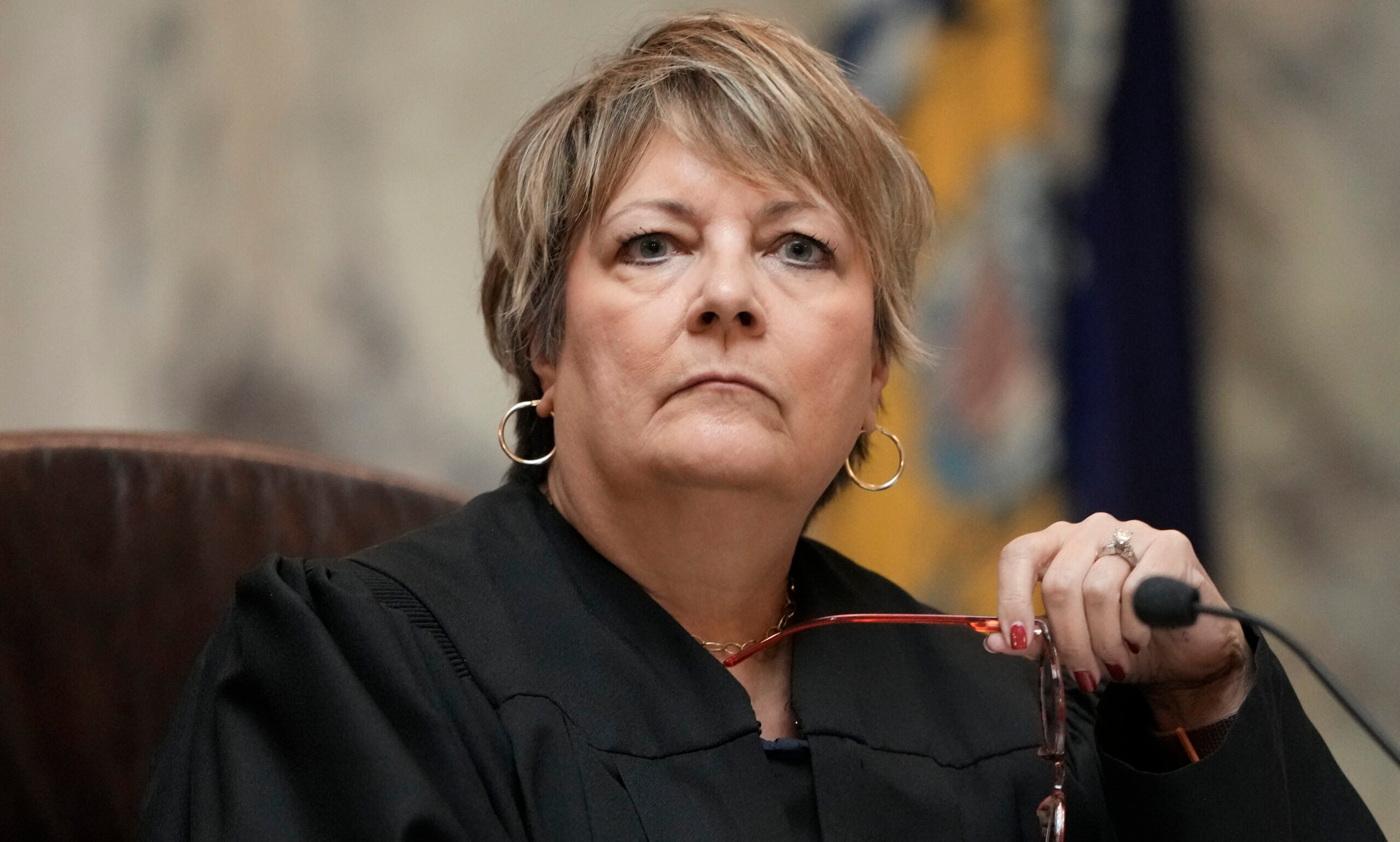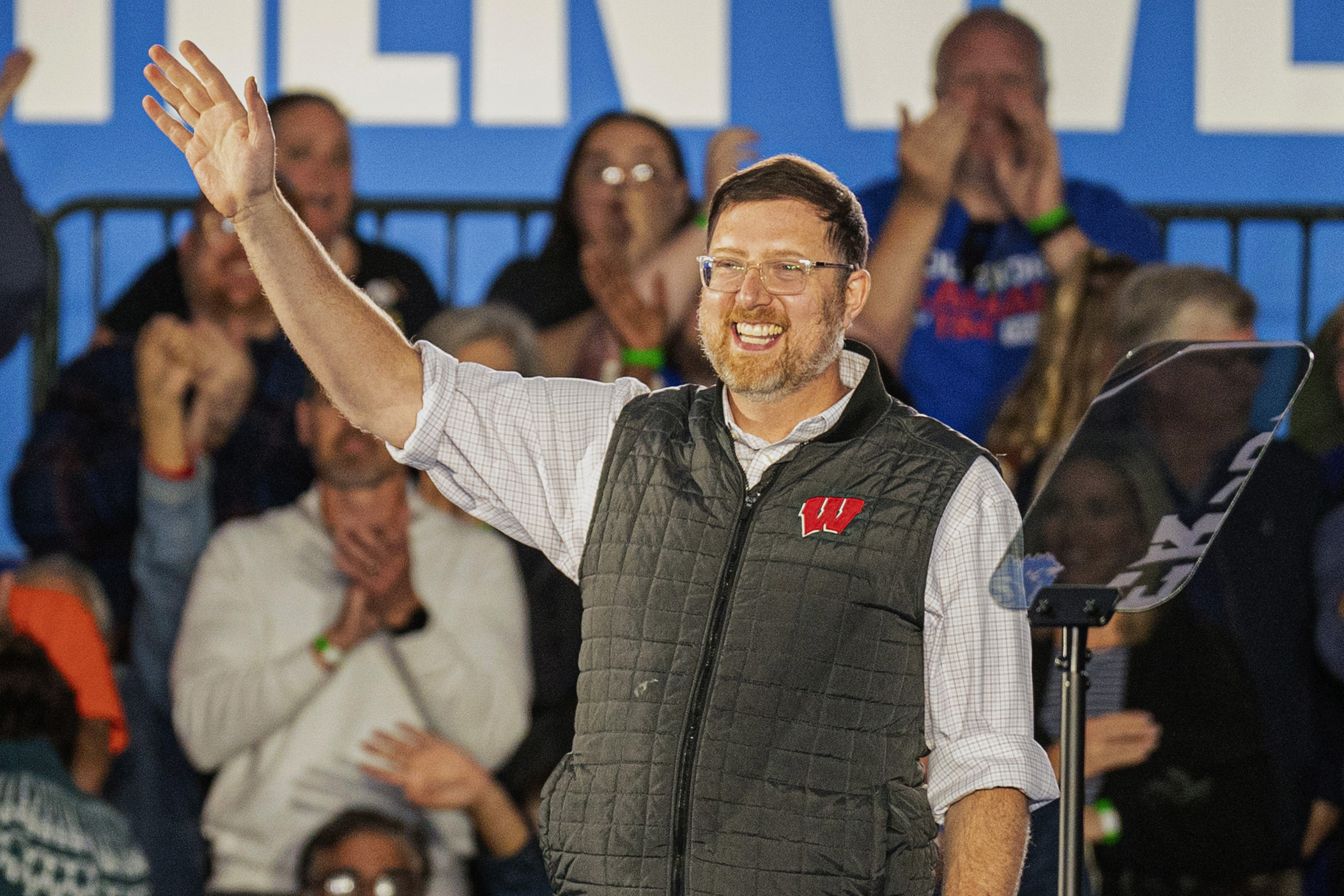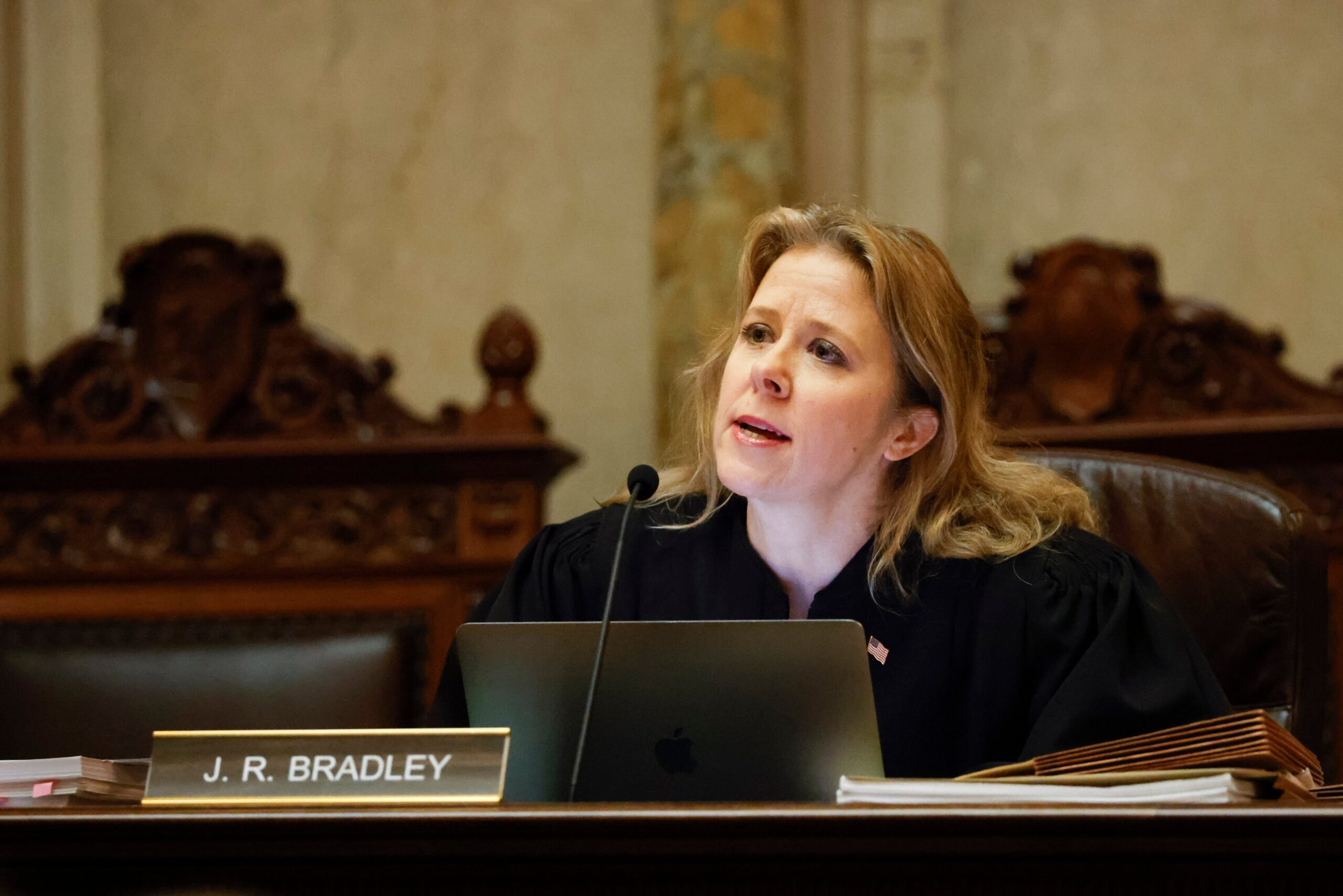There was a time not too long ago when campaigns for the Wisconsin Supreme Court were obscure, low-turnout affairs, the kind where candidates talked in technical, legal language and otherwise reliable voters stayed home. Janet Protasiewicz is doing everything she can to prevent that this year, with a big assist from the Democratic Party.
Protasiewicz, a circuit court judge from Milwaukee County, has run a Supreme Court campaign on a scale never before seen nationally, let alone in Wisconsin. Her campaign fundraising has shattered records, funding an ad blitz that’s hard to avoid, both on TV and online.
Her message has also been openly political. While other judicial candidates might hint at or even hide their personal beliefs, Protasiewicz has shared them for the world to see. She’s spoken unambiguously about her support for abortion rights and her dislike for the state’s Republican-drawn legislative maps.
News with a little more humanity
WPR’s “Wisconsin Today” newsletter keeps you connected to the state you love without feeling overwhelmed. No paywall. No agenda. No corporate filter.
It’s all part of an effort to drive up Democratic turnout for a race that could flip the ideological balance of the court to liberals for the first time in 15 years. And in the Democratic stronghold of Madison, there are signs that it’s working.
On a Saturday night in March, people lined up down the sidewalk outside the Barrymore Theater on Madison’s East Side. The featured act that night, a live recording of the national show Pod Save America, was in town to bring a spotlight to Wisconsin’s Supreme Court race.
Person after person waiting to attend the show said they were fired up for Protasiewicz, with most pointing to the same short list of reasons.
“Two main things,” said Ariel Hendrickson of Madison, who was first in line for the show on the sidewalk outside. “Abortion rights and making sure that gerrymandering does not get any worse in our state.”
Sheila Hosseini of Madison wanted to attend because she’s a fan of Pod Save America, but the stakes of Wisconsin’s court race weren’t lost on her.
“I know people keep saying this, but this is probably one of the most important elections for Wisconsin, especially because reproductive rights are on the line,” Hosseini said.
Cailin O’Connor described herself as a big supporter of Democrats, saying she’d been canvasing to get out the vote for Protasiewicz earlier that day.
“It gives us a chance to get past our gerrymandered districts,” O’Connor said. “And hopefully it can get us to a point where we could actually have reproductive rights in the state again.”
It can be easy to take this kind of attention for granted in an era where one election cycle seemingly merges with the next, especially in Wisconsin where close elections are a way of life. But a spotlight like this is anything but normal in a race for the court. For Wisconsin Democrats, at this moment, the race is everything.
‘The issues are so absolutely critical’
Protasiewicz was born and raised on Milwaukee’s south side. She received her bachelor’s degree from the University of Wisconsin-Milwaukee and her law degree from Marquette University.
She spent 25 years as a prosecutor in the Milwaukee County District Attorney’s office. In 2013, Protasiewicz ran for a judgeship on the Milwaukee County Circuit, losing to now-Justice Rebecca Bradley. She ran again in 2014 and was unopposed.
In an interview with PBS Wisconsin, she said the more she thought about the Supreme Court race, she decided she had to run because so much was on the line.
“I’ve had contested races,” Protasiewicz said. “I like to campaign. I like people. The issues are so absolutely critical.”
The recent podcast event in Madison offered a clear example of how Protasiewicz has embraced her political supporters by sharing her views on those critical issues. Pod Save America is cohosted by Jon Favreau and Jon Lovett, both of whom were speechwriters for former President Barack Obama. They were joined in Madison by Erin Ryan, a political commentator who hosts her own show on the same podcast network.
The show promised ticketholders “some very special guests on the front lines of the fight for democracy in Wisconsin.” On the stage that night were Ben Wikler, the chair of the Democratic Party of Wisconsin, and Mandela Barnes, the former lieutenant governor who came up just short last year in his run for U.S. Senate.
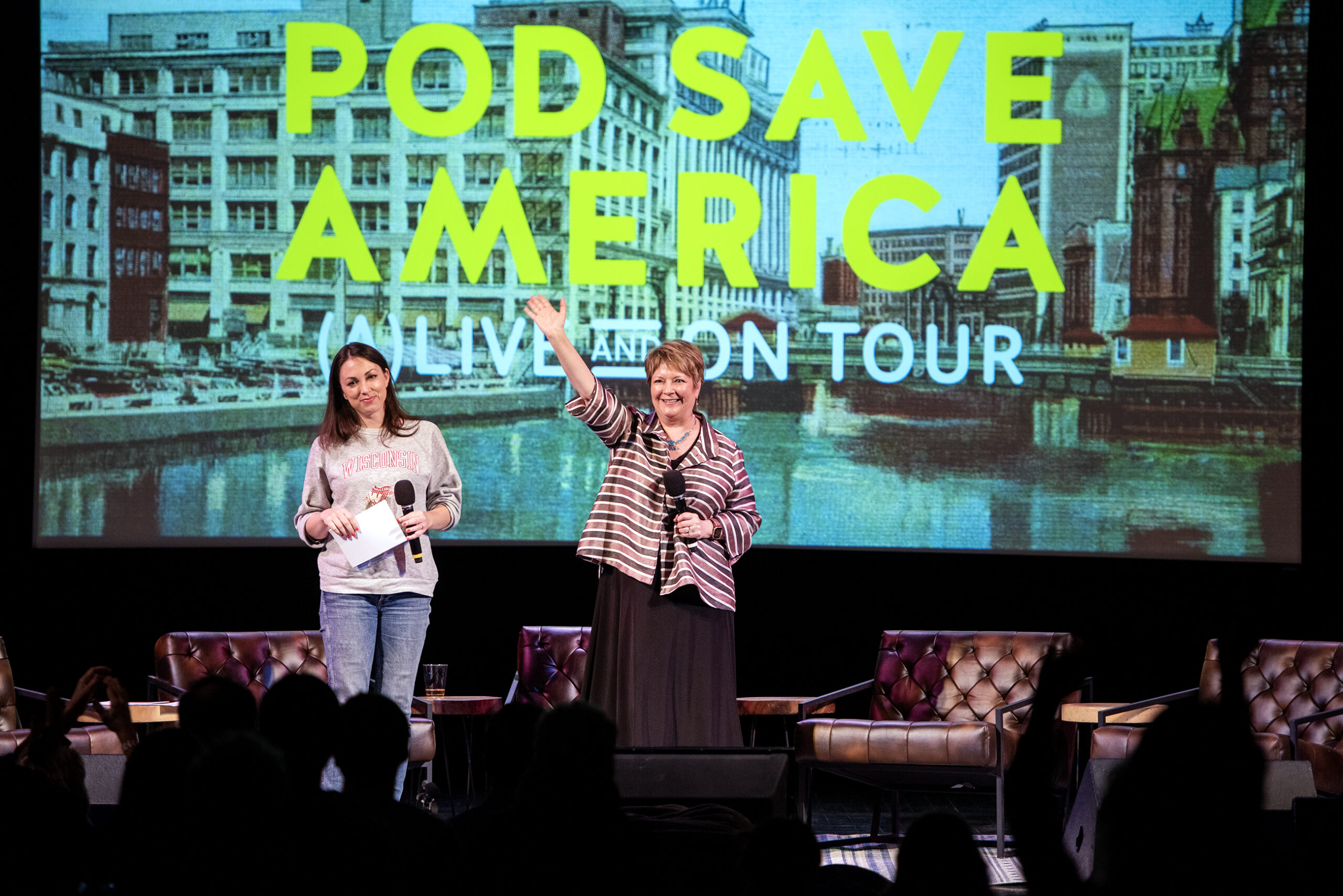
After a short break midway through the show, the crowd roared when Protasiewicz made an appearance, sitting for a brief interview with Ryan while the crowd of hundreds in the theater hung on her every word.
The questions were all squarely in Protasiewicz’s comfort zone. Ryan asked her about the state’s gerrymandered legislative districts. Protasiewicz calls the maps “rigged,” telling Ryan that people aren’t adequately represented.
“My personal value is that our democracy is paramount,” Protasiewicz said. “It is the most important thing that we have. And the way our maps are configured right now, our democracy is at peril. I would certainly welcome the opportunity to have a fresh look at our maps.”
On the issue of abortion, Ryan asked what kind of a difference Protasiewicz could make if she’s elected to the court. Wisconsin’s abortion ban is being challenged in a lower court case which could reach the state Supreme Court.
“I think you all know what my value is,” Protasiewicz said. “People should have a right to choose. That is my value. And I think that that is paramount. And I certainly expect that we will be looking at that issue in the near future.”
Ryan, a Wisconsin native, also asked Protasiewicz about some of the most egregious ways that she has seen “Republicans in Wisconsin ignore the law or the will of voters.” Protasiewicz talked about Act 10, former Republican Gov. Scott Walker’s landmark law that all but eliminated union rights for many public sector workers. The Wisconsin Supreme Court upheld Act 10 in 2014.
“I signed the governor’s recall petition, and I came to this beautiful city and I marched at the Capitol in protest of Act 10,” Protasiewicz said. “The New York Times asked me about it, and they said, ‘What do you think? Do you think that Act 10 was unconstitutional?’ And I said I agree with the dissent in that case, where the author said Act 10 is unconstitutional.”
She said recently that she might recuse herself if a lawsuit challenging Act 10 comes before the court, but she made no promises.
Protasiewicz ended her brief appearance with a dig at Kelly, who lost his 2020 Supreme Court race by 10 points.
“Kelly’s got two Ls, would that be for two losses?” she asks. “Protasiewicz has a W, what does that stand for?”
The crowd roared in approval.
Massive Democratic donations have helped Protasiewicz get the word out
While this event was especially friendly territory for Protasiewicz, these are the kinds of things she’s been saying throughout this campaign.
Protasiewicz talked about “rigged” maps and her personal belief in abortion rights at a candidate forum in January and during her only general election debate with Kelly.
Protasiewicz has amplified her message with the help of a fundraising juggernaut, made possible in large part thanks to the Democratic Party transferring millions of dollars to her campaign.
“We can imagine a world in which the Republican Party of Wisconsin was a fundraising machine, and they just transferred millions and millions of dollars to the Kelly campaign,” said University of Wisconsin La Crosse political science professor Anthony Chergosky. “But that is not the world in which we live. We live in a world in which the Democratic Party of Wisconsin is far stronger at fundraising than the Republican Party of Wisconsin.”
In her latest campaign finance filing with the state, Protasiewicz reported raising more than $13 million this year, bringing her total to $14.5 million since she got into the race. Since Feb. 7, she received more than $8.8 million in transfers from the state Democratic primary.
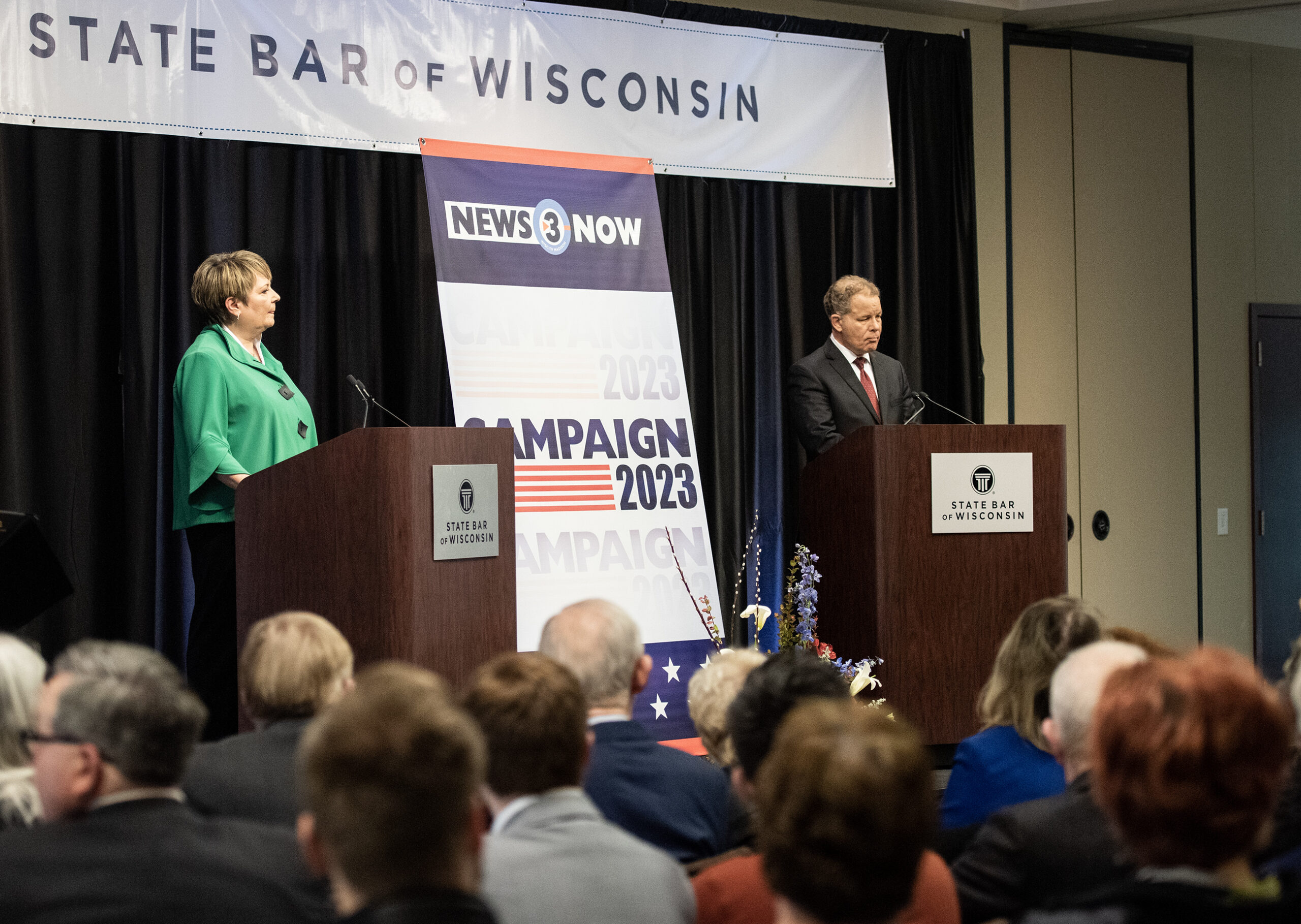
Some of that money has been given to the party in the form of seven-figure donations, including $2 million from LinkedIn co-founder Reid Hoffman, $1 million from Illinois Gov. J.B. Pritzker and $1 million from Democratic megadonor George Soros. Even before the latest haul was reported, Protasiewicz said she would recuse herself from cases involving the Democratic Party of Wisconsin, saying the public might look at the money she’d received from the party and question whether she could be fair.
Wikler, Wisconsin’s Democratic chair since June 2019, tends to frame fundraising decisions as a necessary response to Republican tactics. He points to Wisconsin’s April 2019 Supreme Court election when state Appeals Court Judge Lisa Neubauer, the candidate favored by Democrats, was the presumed favorite in her race against now-Justice Brian Hagedorn, the candidate then favored by Republicans.
In the closing weeks of the 2019 campaign, a group called the Republican State Leadership Committee spent more than $1.3 million on Hagedorn’s behalf, with the goal of mobilizing GOP voters. The strategy worked.
“We wind up losing that race by 5,981 votes,” Wikler told the crowd at the Pod Save America event, reciting the exact margin from memory. “That’s less than one vote per precinct across the state.”
Nobody would suggest that Democrats are underfunded this year, but there are signs Republicans may be closing the fundraising gap. A running tally of campaign spending by the firm AdImpact showed total conservative spending picking up in recent weeks.
There’s one more issue Wikler brings up when framing the race for a national audience, and he did so again at the Pod Save America event. Wikler asked Democrats to imagine a scenario where Kelly wins this campaign, and in November of 2024, the eyes of the nation are again on swing state Wisconsin. Republican lawsuits find their way to the Wisconsin Supreme Court, and after a report of some voting irregularities on Election Day, the court’s conservative majority stops the count.
“And record scratch, freeze frame, you think to yourself, ‘In 2023, I had a chance to stop this guy from getting on the Supreme Court and casting that deciding vote,’” Wikler said.
Discussion of ‘values’ is relatively new, effective in high court races
Wikler isn’t the only one to frame the 2023 Supreme Court race in 2024 terms. Steve Bannon, the adviser to former President Donald Trump, played a CNN story featuring Wikler to open a recent show where he was stressing the high stakes of Wisconsin’s Supreme Court race to conservative voters.
“The head of the Democratic Party is right,” Bannon said. “It is the single most important election in 2023 in the opening salvo to 2024.”
All of this, of course, glosses over a key detail about Wisconsin Supreme Court justices: They’re officially nonpartisan.
There was a time when this was true in more than just name only. A Marquette University review of election results dating back to 1980 found that four decades ago, there was hardly any correlation between the way people voted in Supreme Court races and the way they voted in partisan races for president.
“And now that relationship is very high,” said Marquette University pollster Charles Franklin. “The only thing that’s missing is a D or an R after the candidates name on the ballot.”
Still, there are some who argue that it’s unethical for candidates to share their views on issues the way Protasiewicz has done.
A formal complaint against Protasiewicz, filed in coordination with the state GOP, argues her comments about redistricting and abortion violated the state’s judicial code. That complaint could eventually wind its way to the Supreme Court. (Should Kelly win, he said he would hear the case.)
Former Supreme Court Justice Janine Geske, who was appointed to the court by former Republican Gov. Tommy Thompson in 1993, then elected in 1994, blames both sides for politicizing the court.
“Historically, when we ran, and I ran a long time ago, we wouldn’t go anywhere near talking about an issue that might come before the court,” Geske said. “I am very concerned that we are losing that impartial branch of government.”
When conservatives flipped the court in 2008, former Justice Louis Butler, the candidate favored by liberals, largely kept his politics to himself.
“I think it is inappropriate for a judge or a justice to tell you that I’m a conservative or a liberal or I’m a candidate of big business or law enforcement or labor or whoever,” Butler said during a 2008 debate just days before the election. “Because you’re trying to send a signal that if you vote with me, I’ll vote with you, and that’s not what the justice system is all about.”
Butler lost that race by 22,303 votes to former conservative Justice Mike Gableman.
Democrats started to get more actively involved in court races 2018. That year, now-Justice Rebecca Dallet campaigned at the annual State Democratic Party convention, and talked extensively during her campaign about her values, which she said included public schools, workers’ rights and women’s rights. Dallet won her race by about 12 percentage points.
In 2020, liberal Justice Jill Karofsky also emphasized her values, expressing concerns about guns in schools and saying the state should be making it easier to vote. Like Dallet, Karofsky won by double-digits.
For liberals, the lone exception to the recent trend of politicizing court races was Neubauer, who ran a more traditional judicial campaign in her narrow 2019 loss to Hagedorn.
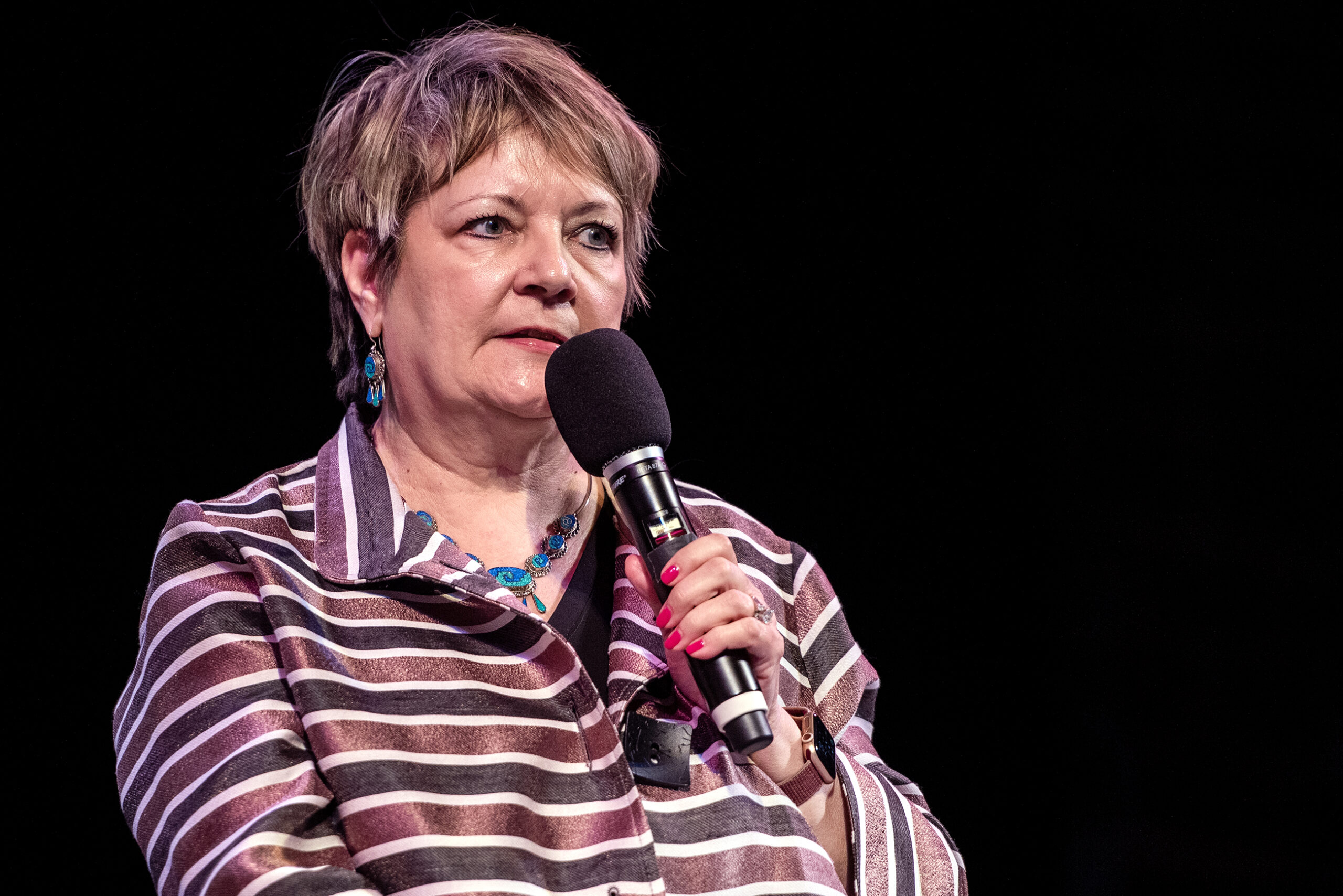
Each time Protasiewicz talks about her values, she qualifies her comments by saying she’s not promising to rule one way or another on lawsuits involving redistricting or abortion.
But several of the Democrats who turned out to hear her in Madison said they’d be surprised if Protasiewicz won and upheld the state’s abortion ban or its Republican drawn legislative maps. They appreciate her open approach given the circumstances.
“I think in today’s hyper-partisan world, it’s important to know where people stand, because it has real world consequences,” said Jeremiah Shaw of Madison. “This illusion of electing completely neutral people — I don’t know that it was ever the case, but it’s certainly not the case these days.”
Carol Drysdale of Madison said she was voting for Protasiewicz because of her position on abortion, which she said was more than a purely judicial matter.
“I think that it’s a nice idea that there’s ways to be completely objective, that someone can leave behind everything that they are and everything that they have experienced and lived through and just leave it all at the door and be completely objective. But that’s not how human beings work,” Drysdale said.
“It’s tough, right?” said Alexandria Delcourt of Madison. “They’re supposed to be as neutral and aligning with written law as possible.”
But Delcourt said it was important for her to vote for a candidate who’s a champion of reproductive rights at a time when they’ve been stripped away in states around the country. Protasiewicz, she said, aligned with her views.
“There’s no such thing as a 100 percent impartial person,” Delcourt said. “People are people. People have experiences. And those experiences directly translate to how they interpret laws.”
Editor’s note: Read WPR’s profile of Supreme Court candidate Dan Kelly here.
Wisconsin Public Radio, © Copyright 2025, Board of Regents of the University of Wisconsin System and Wisconsin Educational Communications Board.



